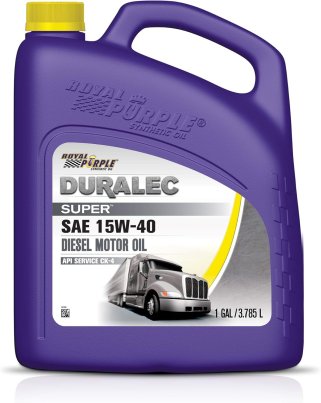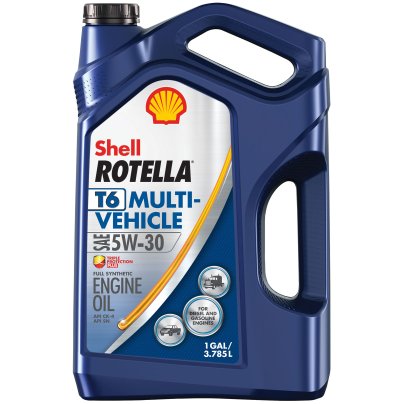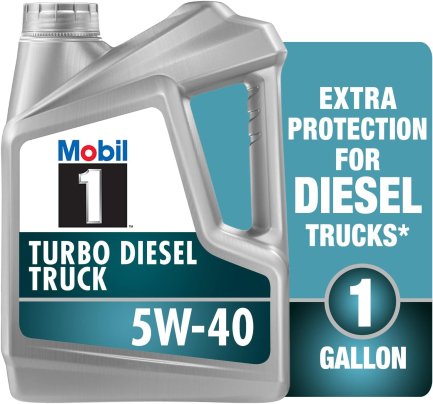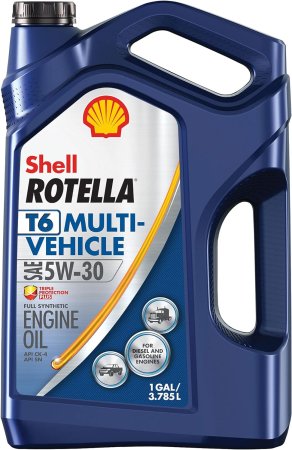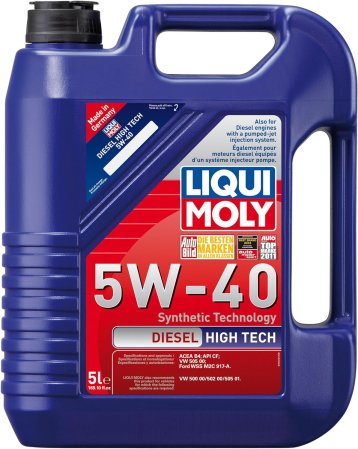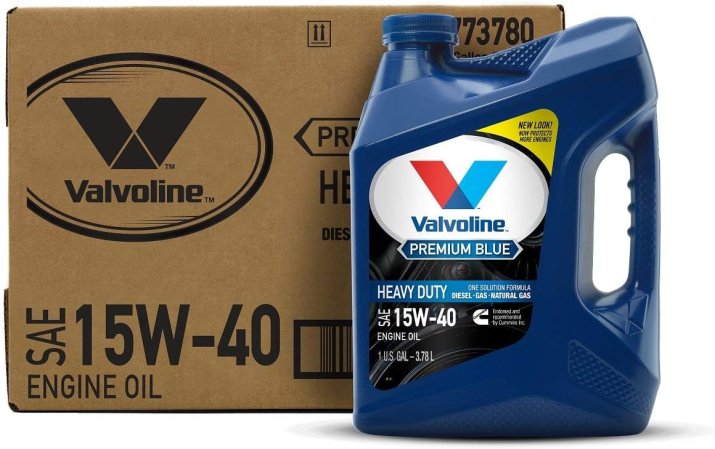We may earn revenue from the products available on this page and participate in affiliate programs. Learn more ›

Engine performance is essential to your vehicle’s overall function, and it needs proper care and nourishment to do its job. By choosing the best oil for your car or truck, you’re taking proactive steps to improve its performance and assist in overall reliability. Not to be confused with standard conventional and synthetic engine oil, diesel engine oil features a higher parts-per-million measurement of additives to help prevent sludge buildup.
Because of this, it’s important to select the right diesel-specific oil that’ll give your vehicle’s heart a long, healthy life.
Of course, not all diesel oil is alike. In the century-and-a-half since its invention, countless manufacturers across the globe have come up with some outstanding black-gold innovations. The key to success is finding the best diesel oil for your truck and the road conditions you’ll most likely face. We’ve broken down the best diesel oils available on the market today—check ’em out!
Summary List of the Best Diesel Oils
- Best Overall: Royal Purple 15W40
- Best Value: Shell Rotella T6 Full Synthetic Multi-Vehicle 5W-30 Diesel Engine Oil
- Honorable Mention: Mobil 1 Turbo Diesel Truck Full Synthetic Motor Oil 5W-40
- Honorable Mention: Liqui Moly Diesel High Tech Synthetic 5W-40 Motor Oil
- Honorable Mention: Motul 8100 X-Clean+ 5W30 100% Synthetic Engine Oil
- Honorable Mention: Valvoline Premium Blue SAE 15W-40 Diesel Engine Oil
- Honorable Mention: Delo 400 SDE SAE 15W-40 Motor Oil
Our Methodology
We can’t put our own hands on every item available. In these instances, we put our collective experience in journalism, research, and prior product testing to use to make our product picks. Items that are used by our own staff may get earnest endorsements as well, but we’ll never accept fees or bonuses to sell you stuff we’re not actually excited about. Affiliate revenue is always disclosed.
The Drive aggregates reviews and research from all over the internet to figure out which products are worth buying. We also put out shopping guides to help you understand how to assess the value of these things on your own. As we always say, “Knowledge is horsepower!”
Best Diesel Oils: Reviews & Recommendations
Best Overall
Royal Purple 15W-40 Oil
Best Value
Shell Rotella T6 Synthetic Diesel Motor Oil 5W-40
Pros
- Great price
- Excellent amount of detergents
- Full-synthetic
Cons
- Not effective in hot climates
- Doesn’t come in a very wide range of viscosities
Honorable Mention
Mobil 1 Turbo Diesel Truck Full Synthetic Motor Oil 5W-40
Pros
- Trusted synthetic blend
- Comes in a good variety of viscosities
- Good life that extends service intervals
Cons
- Not as detergent-rich as other oils
- Higher price
Honorable Mention
Liqui Moly Diesel High Tech Synthetic 5W-40 Motor Oil
Pros
- Specially formulated for turbocharged engines
- Excellent long-life formula
- Solid amount of detergents and wear additives
Cons
- One of the most expensive options
Honorable Mention
Motul 8100 X-cess 5W-40 Synthetic Gasoline and Diesel Engine Oil
Pros
- High percentage of detergents
- Very low wear over time
- High resistance to heat
- Good variety of viscosities
Cons
- Very expensive
- Bottles can be troublesome to use
Honorable Mention
Valvoline Premium Blue Synthetic Oil
Pros
- High detergent volume
- OEM recommended
- Bargain price for the performance
Cons
- Only available in large quantities
- Could be cumbersome to change
Honorable Mention
Chevron Delo 400 SDE Heavy-Duty Diesel Engine Oil
Pros
- Boasts solid oxidization prevention
- Great heat tolerance
Cons
- Price
- Available in few viscosities
Our Verdict on the Best Diesel Oils
Your ride deserves the best diesel oil to help it function better and last longer. The Royal Purple 15W-40 Oil is a worthy pick overall, improving fuel efficiency and preventing corrosion. Looking for a more budget-friendly choice? The Shell Rotella T6 Synthetic Diesel Motor Oil 5W-40 CJ-4 is an excellent way to preserve the health of your engine and your wallet.
FAQs
You’ve got questions. The Drive has answers.
A. The main difference between diesel and regular oil is the extra wear-resistant contents. Called zinc dialkyldithiophosphate, it works specifically to protect the catalytic converter of a diesel system to create proper combustion. Another thing to note is that diesel oil will almost always be thinner than regular oil—the high viscosity lets it move smoothly at a range of humidities and temperatures.
A. When you pour it in, the oil should not yet have this dark hue. Instead, its color comes as a result of soot, something diesel engines generate in spades. It comes into the oil pan via the combustion chamber. Taking very little of this debris can change the color, so don’t be shocked if your used diesel oil looks like ink.
A. The API donut lets you know if the oil meets the current SL service rating as determined by laboratory and engine tests. There is also the SAE (Society of Automotive Engineers) star logo with the viscosity number and information on whether the oil has passed the energy-conserving test.
A. Synthetic oil: This type of artificially manufactured diesel oil consists of a set of synthesized base oils mixed with additives. The extra chemicals add to the diesel oil’s hydrophobic nature (water-resistance) and help emulsify debris. With detergents to molecularly scrub away debris, it results in cleaner, more efficient combustion.
Depending on the manufacturer, the synthetic oil will feature different additive blends. Many companies like Valvoline and Royal Purple have patents on their proprietary formulas, adding to the benefits of the pure nature of synthetic oil. Since there is no crude oil in the formula, this type has less debris and tends to result in slower wear.
Conventional oil: Back in the day, all diesel oils were conventionally generated. This means that the formula relied on natural ingredients, namely mineral oil. The source of this type of diesel lubricant is crude oil. Because it is naturally sourced, there is less molecular consistency throughout the fluid. Due to this diminished ability to regulate the oil contents, the diesel industry has largely moved away from conventional oil.
Despite this downturn in popularity, you can still find mineral oil for diesel rides, such as the BRP Ski-Doo Mineral Oil. You’re most likely to use this type for off-roading vehicles. It has some chemical imperfections but is extremely affordable.
Hybrid formula oil: Second to the full synthetic formula, hybrid diesel oil is the most common on the market. It consists of a blend of conventional and synthetic ingredients, offering the benefits of both. These solutions provide a fix for some of the downsides of synthetic oils. For one, they are more affordable to source, given that the materials for artificial chemicals are at least double the cost of natural options.
The additives in synthetic formulas can separate if left on the shelf, and the natural movement of the crude oil molecules mitigates this. Plus, when appropriately combined, this type of formula can optimize fuel economy. As a direct result of viscosity control through thermal resistance, this type of oil is well-suited to colder climates.
A. Under $20: Less expensive motor oils tend to be conventional oil or synthetic blends. Synthetic blends are a good choice if you want some of the benefits of full synthetic oil but don’t want to spend too much money. You also pay for the size and type of container, like gallons, quarts, or liters.
$20 and up: Full synthetic motor oils vary in price, and it’s helpful to find the product on sale if you want a good deal. Some can be as cheap as $25, while others can be found starting at $60 and ranging to hundreds of dollars. You’ll get into the upper pricing section when buying in bulk as well.
A. Viscosity: The viscosity grade is one of the most important factors in selecting the right diesel motor oil. Several factors are figured into the viscosity of a vehicle. Diesel engines are commonly rated between 15W-40 and 5W-40. The number before the W indicates the thickness of the oil when it is cold, while the number after is the thickness of oil at normal operating temperatures.
Application: The labels on all types of diesel oil list the specific application that the oil is designed for. Some common oil applications include higher mileage, extended performance, gasoline engines, and motorcycles. Do your homework on your vehicle’s condition before you purchase the best diesel oil for your needs.
Additives: Each diesel motor oil brand adds its own proprietary blend of additives to enhance certain properties. For instance, viscosity-index improvers work extremely well in ensuring that oil doesn’t get too thin at higher temperatures. Other additives like detergents are efficient cleaning agents designed to remove deposits and sludge from your engine. Determine which additives would provide the benefits you need the most before purchasing a synthetic engine oil.
A. Diesel oil compatibility: The first consideration (once you know the oil will work with your diesel engine) is to think about the oil already in place. Most diesel oils will specify whether they are compatible with synthetic, hybrid, or conventional oils. The vast majority of diesel oils are made to work with all different types. Synthetic oils tend to have the highest compatibility rating, working with both old and new vehicles. Check the owner’s manual against the chemical specs to make sure you’re getting the best diesel oil.
Road conditions: Once you’re sure the oil will work with your ride, you can move on to consider the terrain on which you’ll be driving. Depending on the demand placed on your vehicle, the diesel engine will be more vulnerable to wear. The more intense the driving situations, the better the quality of the oil must be.
Quantity and shelf life: Except for the occasional full-scale oil change, you’ll need some top-ups. That means you’ll have a container of diesel oil that’s been opened and left on the shelf. Like everything else, it loses potency as it sits on the shelf. The chemicals can separate and interact with ambient heat for air introduced to the container. To optimize the utility of your oil, be sure that you get something in an opaque container with a good seal and choose quantities that match your needs.
Climate and environment: The demands placed on your diesel engine differ based on ambient conditions. Cold causes oil to thicken, while heat causes it to thin. More humidity in the air means added risk of oxidation. Increased pollution means added likelihood of particulate in your diesel system. Consider the trials your engine must face and aim to find the best diesel oil to make those tasks easier.
It mainly depends on how you store the motor oil. If it’s unopened and kept in a temperature-controlled environment, it should last several years. However, if the oil is left in an open container in a garage that experiences drastic shifts in temperature, it won’t last as long.
